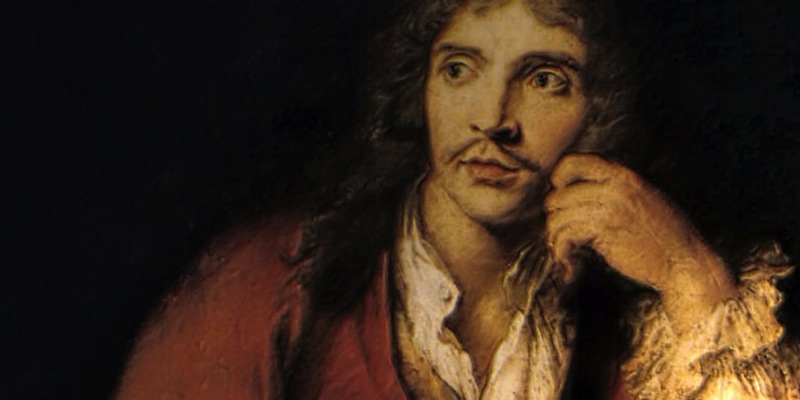Moliere, whose real name is Jean-Baptiste Poquelin, was a French playwright, actor and poet, widely regarded as one of the greatest writers in the French language and universal literature. His extant works include comedies, farces, tragicomedies, comedie-ballets, and more. Take a look below for 30 more fascinating and interesting facts about Moliere.
1. His plays have been translated into every major living language and are performed at the Comedie-Francaise more often than those of any other playwright today.
2. Born into a prosperous family and having studied at the College de Clermont, Moliere was well suited to begin a life in the theater.
3. Thirteen years as an itinerant actor helped him polish his comic abilities while he began writing, combining Commedia dell’arte elements with the more refined French comedy.
4. Through the patronage of aristocrats including Philippe I, Duke of Orleans, the brothers of Louis XIV, Moliere procured a command performance before the King at the Louvre.
5. Though he received the adulation of the court and Parisians, Moliere’s satires attracted criticism from moralists and the Catholic Church.

6. Tartuffe and its attack on perceived religious hypocrisy roundly received condemnations from the Church, while Don Juan was banned from performance.
7. Moliere’s hard work in so many theatrical capacities took its toll on his health and, by 1667, he was forced to take a break from the stage.
8. In 1673, during a production of his final play, The Imaginary Invalid, Moliere, who suffered from pulmonary tuberculosis, was seized by a coughing fit and a hemorrhage while playing the hypochondriac Argan. He finished his performance but collapsed again and died a few hours later.
9. He was born in Paris, France, and was baptized on January 15, 1622.
10. He was the eldest child of Marie Cresse Poquelin and Jean Poquelin, who came from well-to-do families, prominent for two generations as merchant upholsterers.

11. Moliere was followed by five other children, only three of whom survived.
12. When Moliere was ten years old, his mother died, and his father remarried and moved to a house in the cultural and social center of Paris.
13. His father sent Moliere to the Jesuit College of Clermont, an excellent school which was attended by students of the most prominent families, and then had him begin to study law in Orleans.
14. In 1641, Moliere became a notary.
15. In 1631, Moliere’s father had purchased from his brother the largely honorary office of valet and upholsterer to the king. Six years later, he had obtained hereditary rights to the position for Moliere and had him take the oath of office.
16. Given his family background, his education, his profession, and his future court position, Moliere’s pathway to prosperity seemed clearly marked.
17. In 1643, Moliere fell in love with the actress Madeleine Bejart and he renounced his court position, abandoned his social status, and even risked damnation, according to the clerics of his time, in order to become an actor.
18. At one point, Moliere came in close contact with an Italian theatrical troupe. The influence of the troupe’s commedia dell’arte is evident throughout his plays.
19. Despite his own preference for tragedy, which he had tried to further with the Illustre Theater, Moliere became famous for his farces, which were generally in one act and performed after the tragedy.

20. He wrote two comedies in verse, but these were less successful and are generally considered less significant.
21. Later in his life, Moliere concentrated on writing musical comedies, in which the drama is interrupted by songs and dances.
22. Les Precieuses Ridicules won Moliere the attention and the criticism of many, but it wasn’t a popular success.
23. Moliere’s friendship with Jean-Baptiste Lully influenced him towards writing Le Mariage force and La Princesse d’Elide.
24. Moliere was always careful not to attack the institution of monarchy. He earned a position as one of the king’s favorites and enjoyed his protection from the attacks of the court.
25. In his 14 years in Paris, Moliere highhandedly wrote 31 of the 85 plays performed on his stage.

26. The superstition that green brings bad luck to actors is said to originate from the color of the clothing Moliere was wearing at the time of his death.
27. When he died, he did so without receiving the last rites because two priests refused to visit him while the third arrived too late.
28. Under French law at the time, actors weren’t allowed to be buried in the sacred ground of a cemetery. However, Moliere’s widow, Armande, asked the King if her spouse could be granted a normal funeral at night. The King agreed and Moliere’s body was buried in the part of the cemetery reserved for unbaptized infants.
29. In 1792, his remains were brought to the museum of French monuments and, in 1817, transferred to Pere Lachaise Cemetery in Paris, close to those of La Fontaine.
30. A “tartuffe”, a phrase Moliere used in his plays, is a hypocrite, especially a hypocrite displaying affected morality or religious piety. The phrase is still in use today.




